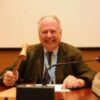Reconciliation in Africa: A Vital Need
TRANSCEND MEMBERS, 6 Feb 2023
René Wadlow – TRANSCEND Media Service
3 Feb 2023 – Pope Francis’ Appeal to the populations of the Democratic Republic of Congo and of South Sudan for reconciliation and forgiveness stresses a vital need to overcome the divisions of the armed conflicts in the two countries. A million people came to the Kinshasa airport to hear the Pope call for an end to the armed conflicts in the eastern Congo, basically the administrative provinces of North and South Kivu. The area is huge, about the size of the U.S.A. east of the Mississippi River. Originally, he had hoped to go to Goma, the major city of eastern Congo, with many refugees from the surrounding area. However, the security situation was such that the itinerary was modified. However, his words reached the area.
The Democratic Republic of Congo has a large Christian population. The activity of Christian missionaries was part of the agreement to create the Congo Free State which was the personal property of the King of Belgium before becoming a Belgium colony. Thus, the Pope’s influence can be real with a fairly strongly developed Catholic Church infrastructure to follow up.
However, the divisions within the country are deep and of long duration. The divisions have both ethnic and economic roots. The Congo’s vast mineral and timber riches have drawn in neighboring armies which have joined local insurgencies as well as local commanders of the national army to exploit the mines and to keep miners in near slavery. The eastern area of Congo has been the scene of fighting at least since 1998 – in part as a result of the genocide in neighboring Rwanda in 1994. In mid-1994, more than one million Rwandan Hutu refugees poured into the Kivus, fleeing the advance of the Tutsi-led Rwandan Front, now become the government of Rwanda led by Paul Kagame.
Many of these Hutu were still armed, among them the “genocidaire” who a couple of months before had killed some 800,000 Tutsi and moderate Hutu in Rwanda. They continued to kill Tutsis living in the Congo, many of whom had migrated there in the 18th century. As the Rwandan groups created their own militias, so did different Congolese ethnic groups, often drawing on their ethnic brothers who deserted from the Congolese army. Deserters and ethnic militias combined to rob and burn villages and to rape on a large scale. Rape as an instrument of war has been widely practiced in eastern Congo.
Systematic rape is a crime which is covered by the mandate of the International Criminal Court (ICC) in The Hague. Rape is a violation of international humanitarian law. Additional Protocol II of the Geneva Conventions prohibits “violence to life, health and physical or mental well-being of persons, in particular murder as well as cruel treatment such as torture…outrages upon personal dignity, in particular humiliating and degrading treatment, rape, enforced prostitution and any form of indecent assault, slavery.”
Into this disorder, in 2002, the United Nations sent peacekeepers, the MONUC, currently some 18,000 persons – the largest U.N. peacekeeping operation. The MONUC mandate has been prolonged with a new Security Council resolution each year that the sponsors hope will be the last. Each year, there is so little improvement in the security situation that the mandate is continued with little debate and with general indifference of world public opinion.
On paper, the U.N. mandate is clear and comprehensive – to build the political, military, institutional, social and economic structures needed to create a secure environment. However, there is no effective Congolese administration. The U.N. troops are not trained to deal with the cultural issues – especially land tenure and land use issues, which are the chief causes of the conflict. U.N. peacekeepers are effective when there is peace to keep. Today, there are an estimated 120 separate armed militias in action.
What is required today in eastern Congo is not so much more soldiers under U.N. command as reconciliation bridge builders, persons who are able to restore relations among ethnic groups of the area. Such bridge builders can help to strengthen local efforts at conflict resolution and the restoration of confidence among peoples in conflict. It must be hoped that the Appeals of Pope Francis will provoke creative action on the part of bridge builders.
______________________________________
 René Wadlow is a member of the TRANSCEND Network for Peace Development Environment. He is President of the Association of World Citizens, an international peace organization with consultative status with ECOSOC, the United Nations organ facilitating international cooperation and problem-solving in economic and social issues, and editor of Transnational Perspectives.
René Wadlow is a member of the TRANSCEND Network for Peace Development Environment. He is President of the Association of World Citizens, an international peace organization with consultative status with ECOSOC, the United Nations organ facilitating international cooperation and problem-solving in economic and social issues, and editor of Transnational Perspectives.
Tags: Africa, Conflict Analysis, Conflict Resolution, D.R. Congo, Peacebuilding, Rwanda, United Nations
This article originally appeared on Transcend Media Service (TMS) on 6 Feb 2023.
Anticopyright: Editorials and articles originated on TMS may be freely reprinted, disseminated, translated and used as background material, provided an acknowledgement and link to the source, TMS: Reconciliation in Africa: A Vital Need, is included. Thank you.
If you enjoyed this article, please donate to TMS to join the growing list of TMS Supporters.

This work is licensed under a CC BY-NC 4.0 License.